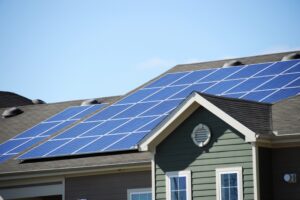Alberta 
$115M spent in Canada annually on low-income energy help. Just not in Alberta
 The global effort to fight climate change is expected to drive up household energy bills — and one researcher is sounding an alarm for Alberta. Rising costs for heat and power are expected to hit low-income households the hardest. Alberta is the only Canadian jurisdiction with no provincewide effort to help, says Abhilash Kantamneni, research associate with Efficiency Canada. It has one-time emergency funding through Alberta Works, and some municipalities have loan programs. But other provinces have rolled out programs that actually foot the bill to reduce the energy consumption of struggling households long term. Alberta used to have a low-income program. The former NDP government used its carbon tax to fund education and home upgrades for low-income residents through the social enterprise Empower Me. Empower Me co-founder Yasmin Abraham says the program helped participants save an average of $1,800 per year on the variable portion of their bill. But it ended with people still on the waiting list because funds ran out and the program wasn’t extended. Many efficiency programs came to an end when the UCP government cancelled the NDP’s carbon tax. Source: CBC News
The global effort to fight climate change is expected to drive up household energy bills — and one researcher is sounding an alarm for Alberta. Rising costs for heat and power are expected to hit low-income households the hardest. Alberta is the only Canadian jurisdiction with no provincewide effort to help, says Abhilash Kantamneni, research associate with Efficiency Canada. It has one-time emergency funding through Alberta Works, and some municipalities have loan programs. But other provinces have rolled out programs that actually foot the bill to reduce the energy consumption of struggling households long term. Alberta used to have a low-income program. The former NDP government used its carbon tax to fund education and home upgrades for low-income residents through the social enterprise Empower Me. Empower Me co-founder Yasmin Abraham says the program helped participants save an average of $1,800 per year on the variable portion of their bill. But it ended with people still on the waiting list because funds ran out and the program wasn’t extended. Many efficiency programs came to an end when the UCP government cancelled the NDP’s carbon tax. Source: CBC News
Electricity Prices for Alberta
The Alberta power pool price averaged 8.697 cents per kWh in March 2022. This price is 1.825 cents lower than last month’s average. The pool price has averaged 10.164 cents per kWh over the last 12 months.
As of April 1, 2022, the forward market was predicting electricity prices for the calendar years of 2022, 2023, 2024, 2025, 2026, and 2027. These prices are 9.200, 7.900, 6.300, 5.900, 5.900, and 5.900 cents per kWh respectively.
Gas Prices for Alberta
Direct Energy’s gas rate for March 2022 was $4.758 per GJ in Alberta. The April 2022 rate has been set at $5.281 per GJ. Alberta gas prices have averaged $4.131 per GJ over the last 12 months.
As of April 8, 2022, the forward market was predicting gas prices for the calendar years of 2022, 2023, 2024, 2025, 2026, and 2021. These prices are 5.46, 4.34, 3.77, 3.83, 4.06, and 4.21 cents per GJ respectively.
British Columbia 
B.C. government creates hydrogen office to woo energy investors
The government of British Columbia has launched a new office to oversee the expansion of certain energy projects in the province. Premier John Horgan announced the creation of the B.C. Hydrogen Office during a Thursday press conference. He said it will act as a “one-stop shopping” spot for hydrogen project investors looking to do business in the province. The plan is also for office staff to help streamline decisions on hydrogen projects and proposals. There are currently 40 hydrogen projects proposed or under construction in B.C right now. According to the province, they represent $4.8 billion in proposed investment. Source: CBC News
Ontario 
Greater Sudbury Hydro to refund customers for 4 years of overbilling
 Each residential customer will receive $17.61 rebate for past 4 years of electricity use. Greater Sudbury Hydro will refund a total of $919,000 to its customers over four years of billing from 2017 through 2020 after discovering it had miscalculated fixed charges dating back as far as 2005. The hydro distributor reported the billing error to the Ontario Energy Board on March 11, 2021, and put in measures to prevent more overcharges. Since then, it has been working with the Ontario Energy Board (OEB) on an “assurance of voluntary compliance,” a document that outlines how the utility will fix the error and compensate its customers. Hydro users will receive a one-time credit on their bill within the next 90 days, set at a flat amount depending on their rate class. For a home customer, the amount for the four-year correction will total $17.61, according to Greater Sudbury Hydro spokesperson Wendy Watson. Source: CBC News
Each residential customer will receive $17.61 rebate for past 4 years of electricity use. Greater Sudbury Hydro will refund a total of $919,000 to its customers over four years of billing from 2017 through 2020 after discovering it had miscalculated fixed charges dating back as far as 2005. The hydro distributor reported the billing error to the Ontario Energy Board on March 11, 2021, and put in measures to prevent more overcharges. Since then, it has been working with the Ontario Energy Board (OEB) on an “assurance of voluntary compliance,” a document that outlines how the utility will fix the error and compensate its customers. Hydro users will receive a one-time credit on their bill within the next 90 days, set at a flat amount depending on their rate class. For a home customer, the amount for the four-year correction will total $17.61, according to Greater Sudbury Hydro spokesperson Wendy Watson. Source: CBC News
Electricity Prices for Ontario
The Hourly Ontario Energy Price (HOEP) was an average of 3.73 cents per kWh in March 2022. This price is 0.212 cents lower than last month’s 3.942 cents per kWh. The twelve month moving average was 3.119 cents per kWh up to March 2022.
The Actual Rate for the Global Adjustment rate Class B for February 2022 was set at 5.246 cents per kWh. The Global Adjustment is an additional charge paid by non-regulated customers. (Source: IESO)
Saskatchewan 
Activist optimistic about Regina’s ‘ambitious’ framework for net-zero emissions by 2050
A framework that is supposed to help Regina reach net-zero emissions by 2050 is being met by optimism from at least one environmental group in Saskatchewan’s capital. The City of Regina’s proposed Energy and Sustainability Framework was released this week. Regina Energy Transition, a group that calls for the city to address climate change, called the program ambitious but attainable. “That’s what we need to do. We’re behind the ball,” said Yvette Crane, a member of Regina Energy Transition. “Other cities have been on this already, so we need to go.” The proposed plan is expected to reduce the city’s emissions by 52 per cent and cut energy consumption by 24 per cent. So far, Regina has put $6 million toward advancing municipal actions, but the entire framework projects a city-wide investment of $12.5 billion by 2050. The framework would bring the community in stride with the global climate mitigation targets. Source: CBC News
Manitoba 
Manitoba must jolt electric vehicles sales, cut emissions significantly to hit net-zero: consultant
 Manitoba needs to turn passenger vehicles electric and significantly reduce greenhouse gas emissions if the province wants to achieve net-zero emissions by 2050, an environmental firm says. The province hired Montreal-based Dunsky Energy and Climate Advisors to devise a new energy policy framework. As part of that effort, the firm detailed what Manitoba must do to meet the federal government’s net zero emissions target by 2050 at the lowest cost. To hit that target, the environmental firm suggests all cars, passenger trucks, SUVs and light- and medium-duty trucks become electric, along with relying on hydrogen and biofuels to fuel most buses and heavy-duty vehicles. Dunsky is suggesting the electrification of 87 per cent of heating systems for buildings, with a focus on geothermal. In turn, the share of natural gas systems used to heat buildings would be cut by 43 per cent. Source: CBC News
Manitoba needs to turn passenger vehicles electric and significantly reduce greenhouse gas emissions if the province wants to achieve net-zero emissions by 2050, an environmental firm says. The province hired Montreal-based Dunsky Energy and Climate Advisors to devise a new energy policy framework. As part of that effort, the firm detailed what Manitoba must do to meet the federal government’s net zero emissions target by 2050 at the lowest cost. To hit that target, the environmental firm suggests all cars, passenger trucks, SUVs and light- and medium-duty trucks become electric, along with relying on hydrogen and biofuels to fuel most buses and heavy-duty vehicles. Dunsky is suggesting the electrification of 87 per cent of heating systems for buildings, with a focus on geothermal. In turn, the share of natural gas systems used to heat buildings would be cut by 43 per cent. Source: CBC News
New Brunswick 
Fredericton seeks to open window on home solar potential
 Use of solar power continues to grow in New Brunswick on a modest scale, according to an installer of home systems, and Fredericton city council is looking at a way to boost it. Demand has roughly doubled every year, said Mark McCann, since he started his business, MJM Solar Solutions, 10 years ago. But there are still only about 300 customers with net metering systems connected to NB Power’s grid, six homes and two businesses with Saint John Energy, and four with Edmundston Energy, according to the utility companies. Fredericton council’s environmental stewardship committee has applied for a grant from the province’s Environmental Trust Fund to hire a consultant to help homeowners better understand their home’s solar power potential. The idea is to create an interactive solar map, such as was recently launched by the City of Calgary.Source: CBC News
Use of solar power continues to grow in New Brunswick on a modest scale, according to an installer of home systems, and Fredericton city council is looking at a way to boost it. Demand has roughly doubled every year, said Mark McCann, since he started his business, MJM Solar Solutions, 10 years ago. But there are still only about 300 customers with net metering systems connected to NB Power’s grid, six homes and two businesses with Saint John Energy, and four with Edmundston Energy, according to the utility companies. Fredericton council’s environmental stewardship committee has applied for a grant from the province’s Environmental Trust Fund to hire a consultant to help homeowners better understand their home’s solar power potential. The idea is to create an interactive solar map, such as was recently launched by the City of Calgary.Source: CBC News
Prince Edward Island 
P.E.I. can have full carbon rebate while still funding environmental programs, say Greens
P.E.I. can return all carbon tax revenues back to Islanders while still funding important programs to reduce emissions, the leader of the Green Party told the legislature Tuesday, the third straight day of debate over the province’s approach to carbon pricing. The Greens are calling on the province to return all $31.6 million it plans to take in from the carbon tax during the next fiscal year in rebates worth (depending on whose estimate you go with) anywhere from $600 to $1,000 per year per household. Government’s plan instead is to provide rebates of up to $140 to households earning less than $70,000 and use the rest of the money to fund existing clean energy programs and offset other fuel taxes. Source: CBC News
Québec 
Recycling contractor withheld at least $1M owed to Montreal, inspector general charges
 Montreal’s inspector general is recommending the city terminate its contracts with the company that runs its two recycling centres “as soon as possible,” after her office’s investigation concluded Ricova withheld at least $1 million it owed to the city over a 12-month period. Brigitte Bishop tabled a damning 35-page report at city hall Monday. She said the company has been systematically withholding some of what it owes the city when it resells recyclable materials. That is a serious enough breach to justify the immediate termination of Ricova’s contracts, Bishop said, except that doing so could leave Montreal without municipal recycling services, which would “not serve the public interest.” The president and CEO Dominic Colubrialehe defended the company, saying there is “no fraudulent manoeuvre here.” Colubriale said the company has generated about $5 million in profits for the city since 2020. He said he will take time to thoroughly analyze the claims and shed light on what he says the bureau may have misunderstood. Source: CBC News
Montreal’s inspector general is recommending the city terminate its contracts with the company that runs its two recycling centres “as soon as possible,” after her office’s investigation concluded Ricova withheld at least $1 million it owed to the city over a 12-month period. Brigitte Bishop tabled a damning 35-page report at city hall Monday. She said the company has been systematically withholding some of what it owes the city when it resells recyclable materials. That is a serious enough breach to justify the immediate termination of Ricova’s contracts, Bishop said, except that doing so could leave Montreal without municipal recycling services, which would “not serve the public interest.” The president and CEO Dominic Colubrialehe defended the company, saying there is “no fraudulent manoeuvre here.” Colubriale said the company has generated about $5 million in profits for the city since 2020. He said he will take time to thoroughly analyze the claims and shed light on what he says the bureau may have misunderstood. Source: CBC News
Newfoundland and Labrador 
‘Lipstick being put on a pig’: Wind power researcher suspicious of government’s motives for lifting ban
On the surface, Nick Mercer of Stephenville says the Newfoundland and Labrador government’s lifting of a ban of wind power is great news for the province. But the Dalhousie post-doctoral research scholar, who has been studying wind power for more than 10 years, says the federal approval of the Bay du Nord oil project two days later left him with a sour taste. In 2016, Mercer released a paper that looked at the barriers to the development of wind energy in Newfoundland and Labrador. He outlined several reasons the province was behind the country in wind energy development, the top of which were government legislation and political will. At the time, he said if the province was turned into a giant wind farm, it could produce 117 times the amount of electricity it consumes. Source: CBC News
Nova Scotia 
Houston continues to eye Atlantic Loop but says it’s not the only option for green energy goals
Although his priority remains making the Atlantic Loop a reality, Premier Tim Houston says he thinks there are other ways for Nova Scotia to achieve its renewable energy goals if the multibillion-dollar project doesn’t come to fruition. The $5-billion project would see transmission lines between Nova Scotia and New Brunswick upgraded to receive flow of hydroelectric power from Quebec and Labrador. Provincial governments are hoping Ottawa will contribute $2 billion toward the effort, but so far do not have a commitment. Houston told reporters at Province House that he continues to have faith that Ottawa will come to the table. Source: CBC News
Nunavut 
Ottawa to pump $214M into Iqaluit water system
 The federal government will spend $214 million to build a new water reservoir in Iqaluit and improve the city’s water distribution system, which has been under pressure as the city grows. The city has been in need of new water infrastructure for years, with one councillor saying recently that it’s the biggest barrier to development in the city. Nunavut MP Lori Idlout — a member of the NDP — also took part in the announcement. The NDP and Liberals reached an agreement in March that will see the New Democrats support the minority Liberal government in the House of Commons until 2025. Idlout has been asking for the federal government to allocate money to solving Iqaluit’s water problems since she took office. She spoke of Iqaluit’s resilience during last fall’s water emergency. Between Oct. 12 and Dec. 10, people in Iqaluit were told not to consume the city’s treated water due to the fuel contamination in the municipal water supply. In January, after fuel contaminated Iqaluit’s water supply again, Idlout wrote a letter to federal Infrastructure and Communities Minister Dominic LeBlanc asking for $180 million. Source: Nunatsiaq News
The federal government will spend $214 million to build a new water reservoir in Iqaluit and improve the city’s water distribution system, which has been under pressure as the city grows. The city has been in need of new water infrastructure for years, with one councillor saying recently that it’s the biggest barrier to development in the city. Nunavut MP Lori Idlout — a member of the NDP — also took part in the announcement. The NDP and Liberals reached an agreement in March that will see the New Democrats support the minority Liberal government in the House of Commons until 2025. Idlout has been asking for the federal government to allocate money to solving Iqaluit’s water problems since she took office. She spoke of Iqaluit’s resilience during last fall’s water emergency. Between Oct. 12 and Dec. 10, people in Iqaluit were told not to consume the city’s treated water due to the fuel contamination in the municipal water supply. In January, after fuel contaminated Iqaluit’s water supply again, Idlout wrote a letter to federal Infrastructure and Communities Minister Dominic LeBlanc asking for $180 million. Source: Nunatsiaq News
Northwest Territories 
N.W.T. beverage container recycling hits record low
The N.W.T.’s beverage container recycling program hit a record low in the 2020-2021 fiscal year — recovering only 62 per cent of the beverage containers that were distributed throughout the territory. That marks a more than 20 per cent drop from the usual recovery rate, which is in the mid-80s, according to Michelle Hannah, the territory’s acting director of waste reduction and management. Although she doesn’t have answers about what happened to those materials instead, Hannah does know why the drop happened: a combination of COVID-19 pandemic closures and delays, paired with an increase in the number of beverage containers people purchased. Recycling depots were closed for a couple of months starting March 19, 2020. Source: CBC News
Yukon 
Yukon officials celebrate federal funding for Atlin Hydro expansion project
Federal, territorial and First Nation officials were in Whitehorse Monday selling a budget measure that will help boost the renewable energy supply in the Yukon. The project, which is still in the technical review stage, is slated to expand the existing two-megawatt hydropower facility in Atlin, B.C., to a 10.5 megawatt facility, and export the new power to Yukon’s energy grid through a new transmission line. The funding comes two months after Yukon Energy signed a 40-year deal with Tlingit Homeland Energy to buy renewable energy beginning in late 2024. Source: CBC News